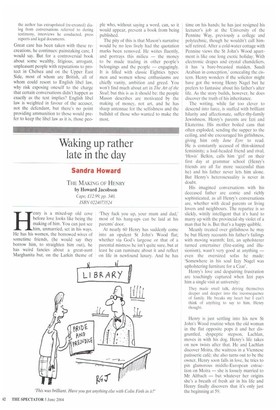Waking up rather late in the day
Sandra Howard
THE MAKING OF HENRY by Howard Jacobson Cape, £12.99, pp. 340, ISBN 0224073524 Henry is a mixed-up old cove before love looks like being the making of him. You can just see him, unmarried, set in his ways. He has his women, the borrowed wives of sometime friends, (he would say they borrow him, to straighten him out), he has weird fancies about a great-aunt Marghanita but, on the Larkin theme of
'They fuck you up, your mum and dad,' most of his hang-ups can be laid at his parents' door.
At nearly 60 Henry has suddenly come into an opulent St John's Wood flat; whether via God's largesse or that of a parental mistress he isn't quite sure, but at least he can ruminate about it and reflect on life in newfound luxury. And he has time on his hands; he has just resigned his lecturer's job at the University of the Pennine Way, previously a college and polytechnic, though he wouldn't call himself retired. After a cold-water cottage with Pennine views the St John's Wood apartment is like one long exotic holiday. With electronic drapes and crystal chandeliers, it has 'a bare-breasted maiden, Saudi Arabian in conception,' concealing the cistern. Henry wonders if the solicitor might have got the wrong Henry Nagel but he prefers to fantasise about his father's alter life. As the story builds, however, he does discover the truth of his inheritance.
The writing, while far too clever to descend into farce, is stuffed with brilliant hilarity and affectionate, suffer-thy-family Jewishness. Henry's parents are Izzi and Ekaterina. His mother boiled cans that often exploded, sending the supper to the ceiling, and she encouraged his girlishness, giving him only Jane Eyre to read. He is constantly accused of thin-skinned femininity; a loaf-headed friend and rival, `Flovis' Belkin, calls him 'girl' on their first day at grammar school (Henry's friends are all far more successful than he) and his father never lets him alone. But Henry's heterosexuality is never in doubt.
His imagined conversations with his deceased father are comic and richly sophisticated, as all Henry's conversations are, whether with dead parents or living lovers and neighbours. The repartee is so slickly, wittily intelligent that it's hard to marry up with the provincial shy violet of a man that he is. But that's a happy quibble.
Meanly treated over girlishness he may be but Henry recounts his father's failings with moving warmth; Izzi, an upholsterer turned entertainer (fire-eating and illusionism), wasn't very good at anything — even the oversized sofas he made: 'Somewhere in his soul Izzy Nagel was upholstering furniture for a Czar'.
Henry's love and despairing frustration are touchingly captured when Izzi pays him a single visit at university:
They made small talk, driving themselves deeper and deeper into the inconsequence of family. He breaks my heart but I can't think of anything to say to him, Henry thought.
Henry is just settling into his new St John's Wood routine when the old woman in the flat opposite pops it and her disgruntled, dyspeptic stepson, Lachlan, moves in with his dog. Henry's life takes on new twists after that. He and Lachlan discover Moira, the waitress in a Viennese patisserie café; she also turns out to be the owner. Henry soon falls in love, he tries to pin glamorous middle-European extraction on Moira — she is loosely married to Mr Altbach — but whatever her origins she's a breath of fresh air in his life and Henry finally discovers that it's only just the beginning at 59.










































































 Previous page
Previous page